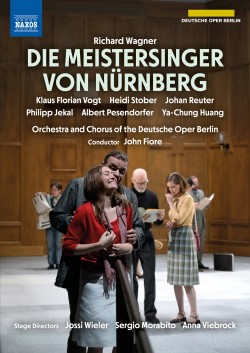 Wagner – Dei Meistersinger von Nurnberg
Wagner – Dei Meistersinger von Nurnberg
Soloists; Orchestra and Chorus of the Deutsche Oper Berlin; John Flore
Naxos DVD 2.110766-67 (naxos.com/CatalogueDetail/?id=2.110766-67)
Deutsche Oper has always been famous for thought-provoking, even iconoclastic, productions so this latest incarnation of Wagner’s lengthy masterpiece comes to us certainly as very different from anything I’ve ever seen before. The scene is a Conservatory with the Masters as professors, the Apprentices as students, all in a modern setting. The school is owned by the wealthy Veit Pogner (Albert Posendorfer, bass) who intends to turn it over to the public by organizing a singing contest but stipulating that the winner must be a Master and should marry his only daughter Eva (Heidi Stober, soprano). The contest is held on Midsummer Day and there are numerous complications, but we all know the story. In this provocative staging the music and the text remain unchanged; there is constant action, and the show is entertaining throughout. But the question remains for someone who has never seen/heard this opera before should I recommend this production rather than an opulent, glorious traditional one such as I grew up with?
The directorial team has decided to “remove the deadweight of previous productions to get closer to the opera itself” which is all about music, the composition and delivery of music. This translates itself into composing a master song and it all comes together beautifully in the wonderful third act. The master song is composed by Walther von Stolzing, the tenor lead (beautifully sung by the latest German heldentenor sensation, Klaus Florian Vogt, who aspires to be a Master and is in love with Eva. The elderly Hans Sachs (Johan Reuter, baritone), a Master and the real hero of the opera, is also in love with Eva but having to give her up, realizes Walther’s song is, although different, truly beautiful. He magnanimously offers advice to improve the song according to the established rules. The master song is then baptized (on St. John’s day) by the glorious quintet Selig wie die Sonne, with all five principals, and later Walther wins the contest and Eva’s hand. A happy ending, indeed.
Deutsche Oper’s giant orchestra pit much resembles the one at the Bayreuth Festspielhaus and the large orchestra is led by John Fiore, an internationally famous American conductor from Seattle. He is much praised by the world’s opera houses as a respected leader with unusual musical sensitivity. The show was enthusiastically received. What more can we ask ?



